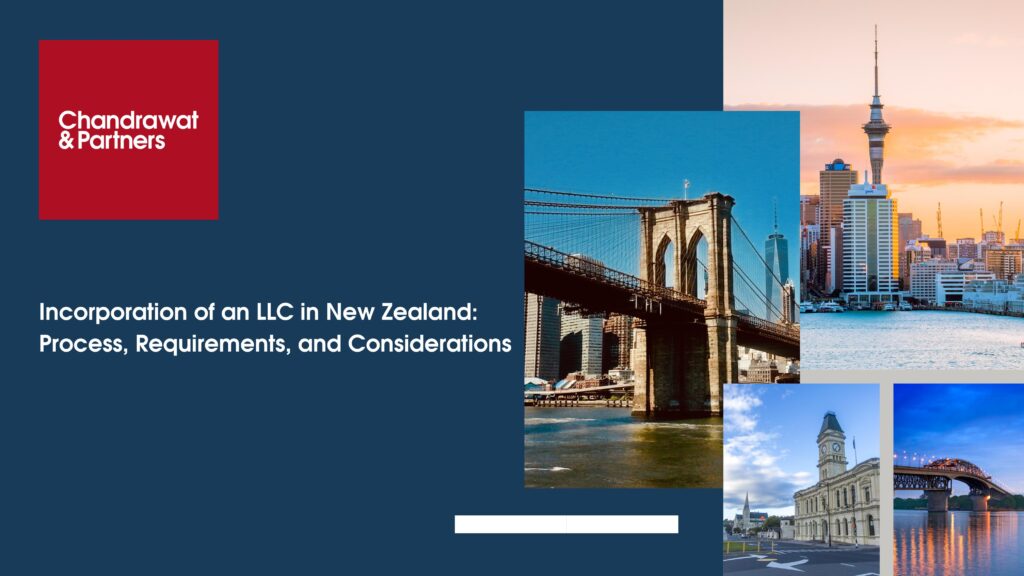
April 10, 2025
Incorporation of an LLC in New Zealand: Process, Requirements, and Considerations
New Zealand offers a well-regulated, transparent, and digitally advanced environment for company formation. Establishing a Limited Liability Company (LLC) referred to locally as a Private Limited Company or simply Limited Company is a streamlined process, accessible to both residents and international investors.
This blog outlines the legal structure, steps involved, key requirements, associated costs, and compliance obligations relevant to company incorporation in New Zealand.
Legal Framework and Entity Overview
A Limited Liability Company in New Zealand is governed by the Companies Act 1993. It is recognized as a separate legal entity, with the following characteristics:
- It can own assets and enter contracts independently of its shareholders.
- Liability of shareholders is limited to unpaid capital on their shares.
- The company maintains perpetual succession, unaffected by changes in ownership.
Advantages of Registering a Limited Company in New Zealand
- 100% foreign ownership permitted.
- Quick and entirely digital registration (typically 1–2 working days).
- No capital gains tax.
- Flat corporate tax rate of 28%.
- No payroll taxes or social security contributions.
- Transparent legal and regulatory system.
- Strong reputation for ease of doing business (ranked among the top globally).
Process for Incorporation
- Company Name Selection
- Must be unique and not resemble existing company names.
- The suffix “Limited” or “Ltd” is mandatory.
- Availability can be checked through the Companies Office website.
- Director and Shareholder Requirements
- Minimum of one director is required.
- At least one director must reside in New Zealand or be a director of a company registered in both Australia and New Zealand.
- There is no restriction on foreign shareholding; shareholders may be individuals or entities, local or foreign.
- Registered Office Address
- A physical address located in New Zealand must be provided as the registered office.
- This address is used for official correspondence and legal notices.
- P.O. Boxes are not permitted.
- Company Registration
- Carried out online through the Companies Office portal: companiesoffice.govt.nz
- Requirements include:
- Reserved company name
- Details of registered office and address for service
- Full identification and contact information for directors and shareholders
- Signed consent forms from all officers
- Registration fee: approximately NZD $130
- Inland Revenue and GST Registration
- An IRD number must be obtained from Inland Revenue for tax purposes.
- Goods and Services Tax (GST) registration becomes mandatory once annual turnover exceeds NZD $60,000.
- Both registrations can be completed online via the Inland Revenue portal.
Ongoing Legal and Compliance Obligations
- Annual Return: A basic annual return must be submitted to the Companies Office to confirm and update company details.
- Tax Filing: Annual corporate income tax returns are required by the Inland Revenue Department (IRD).
- Record Keeping: Accurate financial records, resolutions, and company minutes must be maintained.
- Audit Requirements: Large companies with significant overseas ownership may be required to file audited financial statements.
Typical Costs of Incorporation and Operation
-
Additional expenses may apply for legal consultation, virtual office services, nominee directors, or compliance management.Item
Approximate Cost (NZD)
Name Reservation
$10–12
Company Registration Fee
$130
Annual Return Filing
$45
GST & IRD Registration
Free
Accounting/Professional Services (optional)
$300–1,000+
Foreign Ownership and Control Considerations
- Full foreign ownership is allowed.
- At least one resident director (NZ or qualifying Australian-based) is required.
- Enhanced identity verification under New Zealand’s anti-money laundering (AML) legislation may be necessary.
- Business bank account setup for overseas principals may involve additional due diligence or local representation.
Additional Information and Resources
- Intellectual property (such as trademarks) may be registered.
- Professional firms in New Zealand offer incorporation services, including legal, accounting, and nominee directorship arrangements.
Conclusion
The incorporation of a Limited Liability Company in New Zealand is efficient, cost-effective, and supported by a highly transparent legal system. With full foreign ownership permitted, minimal bureaucratic hurdles, and a stable business environment, New Zealand continues to attract investment and entrepreneurial activity across various sectors.
For long-term operations, attention should be given to regulatory compliance, tax obligations, and governance practices to ensure smooth functioning and legal standing of the entity.
For more information or queries, please email us at
enquiries@chandrawatpartners.com
Key Contact

Surendra Singh Chandrawat
Managing Partner

